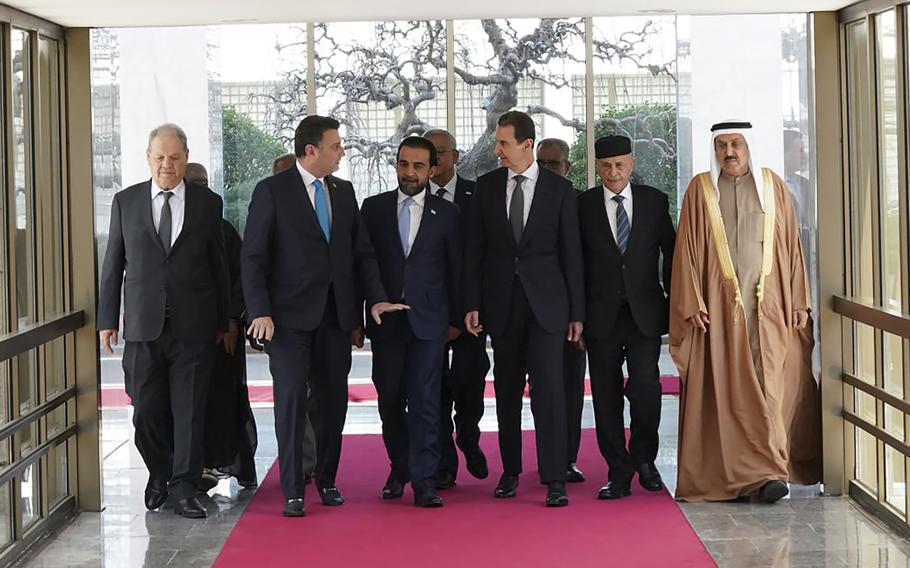The European Union became the last Western power that eased sanctions against Syria after the United States and the United Kingdom,
Syria’s Assad and his media consider these steps as a victory for Assad’s “steadfastness.”
Still, they call for more in what they describe as a “siege for the Syrian people.”
The United States and the EU have repeatedly confirmed that their sanctions are against Assad and his regime not the Syrian people.
The EU said it was temporarily easing sanctions on Syria to speed up aid deliveries to the country two weeks after the devastating earthquake.
The change made Thursday means “the EU has waived the need for humanitarian organizations to seek prior permission from EU member states’ national competent authorities to make transfers or provide goods and services intended for humanitarian purposes to listed persons and entities,” the European Council said in a statement.
The measure will last six months and was taken “in view of the seriousness of the humanitarian crisis in Syria, exacerbated by the earthquakes”.
Since the devastating earthquake, the EU and its member states have provided €3.5 million ($3.7 million) in humanitarian assistance to cover the most urgent needs.
Top Arab lawmakers in Syria for talks with President Assad
Meanwhile, senior Arab lawmakers were in Syria on Sunday for talks with President Bashar Assad on bringing his country back into the fold of the Arab world. The visit follows a mini-summit in Baghdad that affirmed the Arab League’s intentions of having Syria return to the organization despite the country’s devastating civil war.
Lawmakers from nine Arab countries and Palestinian representatives made up the delegation — reflecting a continuation in the thawing of relations with Assad, who for over a decade has been isolated from most of the region, AP reported.
First to arrive in Damascus was Egypt’s Parliament Speaker Hanafy el-Gebaly, the most senior Egyptian official to visit Syria in over a decade. Iraq’s parliament speaker, Mohammed Halbousi — among several Arab leaders who have been calling for Syria’s return to the Arab League — headed the delegation.
On Saturday, the Arab Inter-Parliamentary Union met in the Iraqi capital, Baghdad, after several Arab countries moved to reestablish ties with Assad in recent years.
El-Gebaly told reporters after landing in Damascus that the Arab delegation was “visiting brotherly Syria to support the Syrian people” after the quake. He cited the joint statement from the Baghdad meeting about the need to begin the process of “bringing Syria back to the Arab fold.”
“It’s natural that Syria will return someday, God willing, and matters will return to what they once were,” he said.
Iran Potentially Selling Khordad-15 SAMs And EWs To Syria
Militarily, Iran is apparently considering selling Khordad-15 SAMs along with electronic warfare suites. The amount is currently unknown as no definitive information has been released.
According to Atlas News, the speculative nature also coincides with the fact that the IRIB News Agency briefly mentioned that few details had been released concerning a recent defence agreement between the two countries. There is no evidence of this agreement on either Iranian or Syrian news outlets besides IRIB itself.
The potential selling of these weapons is likely a response to the recent air strike that occurred on February 19. Syrian officials claim that the strike was carried out by Israel, which adds to a long list of growing attacks between Iran and Israel in recent years. Five people died due to the strike, and a great deal of damage was done to surrounding buildings. Reuters stated that the strike likely targeted the building as it was being used as a security complex by Iranian Revolutionary Guard Corps (IRGC) forces.
SDC Opposes Any Normalization With Syrian “Regime”
Syrian Democratic Council (SDC) announced on Saturday its opposition to any Arab or regional normalizations with the Syrian “regime,” as any normalizations will only grant it legitimacy and not lead to political solutions.
In an interview with Asharq Al-Awsat, Ilham Ahmed, President of the Executive Committee of the SDC, said that US officials assured that the recent sanctions waivers on Syria were only released to facilitate the delivery of aid into quake-affected areas and they do not go against the Caesar Act.
Regarding to Syrian President Bashar al-Assad’s recent trip to Oman, Ahmed deemed that such visits would not lead to a political solution in Syria and “not serve the Syrian people.” The SDC is the political wing of the Syrian Democratic Forces (SDF) and the Autonomous Administration of North and East Syria (AANES). It was founded in 2015 and included all the communities of North and East Syria.
“The delivery of international and Arab humanitarian aid should be monitored by international observers,” she stressed.
The SDC President of the Executive Committee said, “The ruling regime has not changed its stance, not on the humanitarian or political levels.”
She also called on the government and the opposition in the aftermath of the Feb 6 earthquake to handle the catastrophe from the humanitarian angle and to “set aside political disputes.”
Jordan shoots down drone carrying weapons from Syria
Jordan’s army said Saturday that it shot down a drone carrying weapons from neighbouring Syria, the New Arab reported.
The drone was used in an attempt to “smuggle weapons and hand grenades” into Jordan, read the Jordanian Armed Forces statement.
According to the statement, a rifle and four hand grenades were found where the drone had been shot down.
Jordan has for years struggled to thwart smuggling from war-torn Syria, particularly drugs.
Syria is the suspected source of much of the Middle East’s drug trade, including captagon.
Jordan has pointed to Iranian-linked militias and the Syrian regime as the source of the drug smuggling. At the same time, analysts also say that Lebanon’s Hezbollah militia is active in the trade.
The two countries have in the past agreed to cooperate on border security. Russia, a key backer of the Syrian regime, has also said it is willing to help combat the smuggling.


